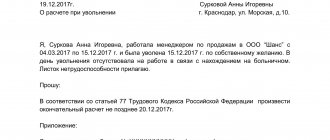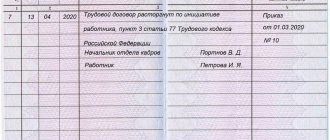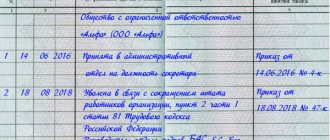If an employee resigns, he must be paid compensation for all unused vacations. This is a requirement of the Labor Code. Accordingly, it is important for both the employer and the employee to understand how to calculate compensation for unused vacation upon dismissal over several years. Let's analyze the current legislation and look at some examples of how vacation days are calculated, how to calculate an employee's average earnings, and whether additional vacations are taken into account along with the main vacation when paying compensation for unused vacation upon dismissal.
Basic Concepts
According to Articles 114 and 115 of the Labor Code of the Russian Federation, only those persons who have worked in one organization for at least 6 months can receive the right to annual vacation. In this case, the minimum period of each regular leave for them will be:
- At least 28 days for a regular employee;
- More than 31 days – for people with irregular schedules;
- From 30 days – for disabled people of categories 1, 2 and 3;
- At least 35 days – for personnel working in hazardous conditions.
It is important to know! If desired, a citizen can take two weeks of vacation provided for him at once, and leave unused vacation days for later, dividing them into as many parts as he deems necessary (even daily division is allowed).
But in accordance with Art. 123 of the Labor Code of the Russian Federation, before distributing annual rest over several separate periods, the employee must agree on the resulting schedule with management. And this applies to all subordinates, with the exception of pregnant women, minors, part-time workers and women married to military personnel. The listed categories have the right to take vacation at any time convenient for them.
What happens to lost vacation upon dismissal?
At the time of dismissal, most employees usually have several days of unpaid vacation. The company has the right to repay the resulting debt in two ways:
- pay the employee monetary compensation for all days of unused vacation;
- send the employee on annual paid leave for the number of days he is entitled to, and then fire him.
The right to choose one or another method of compensation belongs to the employee. The employer cannot force him to prefer any specific option.
Read also
22.11.2017
Unused vacation
Every officially employed citizen can take a leave of absence. Typically, this may be due to the following situations:
- The employee refused to rest;
- The subordinate took only 14 days off from his allotted 28 days.
This debt must be recorded in schedule T-7, with a transfer to the next year (in column number 5, where all additional employee time off accrued to him in accordance with the Labor Code of the Russian Federation is indicated). A subordinate can take unused vacation for previous years in the form of:
- Extending the next rest;
- Monetary compensation, the amount of which is calculated at a flat rate.
In addition, the employee’s accumulated time off will be taken into account upon his dismissal, which may lead to the cancellation of two weeks of work or an increase in severance pay.
Replacement of part of vacation with compensation
In some situations, an employee may transfer his remaining leave from the previous year to another period.
Replacement of cash compensation for annual basic leave of 28 days per year is unacceptable . An exception is payment for the remaining vacation days upon dismissal of an employee. Moreover, the article under which the employee is dismissed does not .
But additional leave, unlike the main one, can be compensated by cash payment.
EXAMPLE
Accountant Savelyeva E.A. has the right to additional leave for irregular working hours in the amount of 4 days. For 2021, she still had 2 days of additional leave left. If in 2020 she goes on vacation for 28 days, then she can replace the remaining days of additional leave with compensation.
To do this you need to write an application. You can download the application form here:
APPLICATION FOR COMPENSATION FOR NON-TIME LEAVE: SAMPLE
However, it is worth noting that not all employees can receive compensation for additional leave. According to Part 3 of Art. 126 of the Labor Code of the Russian Federation, for pregnant women and minor workers cannot be compensated by monetary payment
also prohibits replacing additional rest with compensation for employees engaged in hazardous working conditions. For this category of personnel, it is possible to replace additional leave with money only for the minimum duration of additional leave - i.e. 7 days . This confirms Part 3 of Art. 126 and part 2 and art. 117 of the Labor Code of the Russian Federation, letter of the Ministry of Labor of Russia dated June 18, 2020 No. 15-1/OOG-1710.
also impossible to replace annual additional paid leave for Chernobyl workers with compensation due to the fact that the Law of the Russian Federation of May 15, 1991 No. 1244-1 does not provide for such compensation.
Mandatory vacation dates
Having received an order to go on regular leave, a subordinate has 14 days to challenge it. If during this period the management agrees to the transfer by signing the appropriate application, then the employee’s days off will be counted for the next year as bonus rest (additional dismissals are indicated in column 5 of the T-7 form).
Attention! If the employer refuses, the employee will have to be removed from official duties no later than 2 weeks after receiving the order not to do so. At the same time, a subordinate will be able to challenge the decision of his superiors only if the period of time off granted to him exceeds 28 calendar days established by the Labor Code (Article 114 Part 1).
This is how vacations will burn out or not
Second: In Art. 124 of the Labor Code of the Russian Federation also has a rule that if an employee has not used his vacation during the year due to some exceptional circumstances, then he MUST use this vacation no later than next year. It is prohibited not to grant vacations for two years in a row. But no one reads this provision of Article 124 of the Labor Code of the Russian Federation as meaning that vacation not used for two years in a row is lost.
And in our country we have a general problem with vacation arrears. On average, companies, based on the results of inspections, have a debt of about 2 years, but there are also those who have such a debt exceeding 3-5 years, most often these are top managers, including the CEO himself. According to Article 124 of the Labor Code of the Russian Federation, if an employee has not used vacation during the year for some valid reason (and this should be the exception rather than the rule), then the employee MUST use vacation in the next year. Failure to provide leave for two consecutive years is prohibited. That is, if we consider according to the logic of Article 124 of the Labor Code, if an employee has 28 calendar days of vacation, then a debt of 56 calendar days is already a gross violation of labor legislation.
First: the ILO Convention, ratified in Russia, according to the Constitution of the Russian Federation and the Labor Code of the Russian Federation, stands above our federal laws. Therefore, even if there were some critical contradictions in the Labor Code, the Convention itself would still apply. Therefore, the arguments that since no amendments have been made to the Labor Code of the Russian Federation, there is no need to apply the Convention are untenable. Moreover, the article very competently cites an extract from the ILO charter, which states that “in no case will the adoption of any convention or ratification of any convention by any member of the International Labor Organization be considered as affecting any law, judicial a decision, custom or agreement which provides the workers concerned with more favorable conditions than those provided for in the Convention.” And lastly: well, let’s remember who the ILO is – whose Convention are we talking about and why do states, as a rule, spend a long time thinking and analyzing whether to ratify this or that ILO Convention?
Yes, because the ILO, speaking in Russian, is an international trade union, which in its acts enshrines increased guarantees for workers. Therefore, an examination is always required before ratification, whether the country will take on increased obligations in relation to citizens that it cannot meet and what acts will have to be adjusted in connection with such ratification and how much it will cost, etc. How can one imagine that the ILO will prescribe something that will worsen the situation of workers, in comparison with the requirements enshrined in most European countries. Maybe we should ask the ILO itself for clarification, instead of guessing what they meant?
And lastly: well, let’s remember who the ILO is – whose Convention are we talking about and why do states, as a rule, spend a long time thinking and analyzing whether to ratify this or that ILO Convention? Yes, because the ILO, speaking in Russian, is an international trade union, which in its acts enshrines increased guarantees for workers. Therefore, an examination is always required before ratification, whether the country will take on increased obligations in relation to citizens that it cannot meet and what acts will have to be adjusted in connection with such ratification and how much it will cost, etc. How can one imagine that the ILO will prescribe something that will worsen the situation of workers, in comparison with the requirements enshrined in most European countries. Maybe we should ask the ILO itself for clarification, instead of guessing what they meant? It’s good that officials adhere to the same point of view. Contents: The legislator has limited the maximum “debt for the next annual leave”, so if the employer “accumulates it above the limits established by law, he cannot make payments on such debt by attributing it to reducing the corporate income tax base. In this case, the tax authorities, referring to Art. 255 of the Tax Code of the Russian Federation, require payments for such leave to be attributed to profits, which is quite logical, but may not be very popular with business owners.
Most often, this situation looks like this: an employee has not used vacation for several years or has not used it in full, due to which, for example, a debt has accumulated in the amount of vacation for five years. And the employee quits. Employer under Art. Fall in labor productivity And the third consequence, which, of course, should be taken into account is a drop in labor productivity, a higher level of morbidity and occupational injuries, professional burnout of workers, in relation to whom the legal requirements regarding the provision of regular annual leave are violated. After all, the duration and necessity of this vacation is not a whim, but a physiological need to restore a person’s working capacity.
This is shown by ongoing research throughout international practice. We comply with legal requirements Therefore, it is necessary to strictly monitor that the vacation debt does not exceed the limits established by law. By the way, what are these limits? Here the situation develops differently, taking into account that such a limit is established in Art.
124 of the Labor Code of the Russian Federation and Art. 9 of ILO Convention No. 132.
- Vacation debt: to allow or not?
- The employer has decided to pay off debts for unpaid vacations: is this beneficial for you?
- Employee's vacation debt
- If the employee remains in debt: how to keep
- Vacation pay according to the Labor Code of the Russian Federation
- Incom
- Article 122 of the Labor Code of the Russian Federation. procedure for granting annual paid leave
- How to properly formalize vacation arrears to an employee?
Restrictions on “storing” vacation days
If the manager agreed to transfer the current number of unused days of compulsory vacation, then the employee will need to take this entire period off no later than until December of the next year. Otherwise, his remaining days off will be lost, without the possibility of further compensation.
The only exception, when unpaid leave can be kept for more than two years, is the employer’s refusal to provide rest to a subordinate, the reasons for which were:
- Carrying out urgent work at the enterprise (in this case, management should take care of postponing the leave for the coming months or providing financial compensation as an alternative);
- Bankruptcy of the organization (if a financial crisis occurs, management must amicably resolve the issue of redistributing vacations with their subordinates);
- Lack of a foreman capable of replacing an employee who has gone on vacation.
All of the listed situations that contribute to the forced transfer of time off violate the regulations of Rostrud. Therefore, in order to avoid litigation, the manager will agree to long-term retention of the subordinate’s remaining vacation or to payment of compensation in the amount of his double daily rate.
Procedure for registering unused days
Due to the fact that a non-vacation is no different from a regular vacation, documents for leaving for it should be drawn up in the same order:
- The subordinate is warned in writing 14 days in advance;
- Data on his time off are recorded in schedule T-7 (possible changes are also indicated here);
- Upon returning to the enterprise, the employee signs in the register, after which he receives permission to shift.
If it was not possible to resolve the issue in the standard manner, and you understand that your unused vacation arrears are being burned, then, as an alternative, you should write a refusal to take time off addressed to your superiors, followed by a request for compensation. This option will be most effective in this case, since it allows you to convert accumulated days off into a monetary reward.









